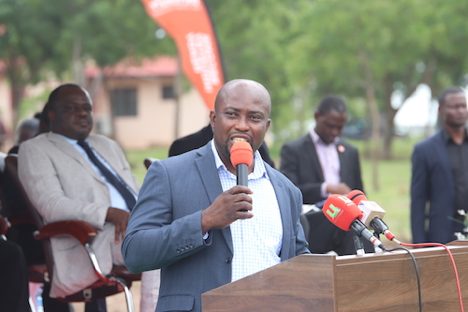Deputy Director of Renewable Energy at the Ministry of Energy, Ing. Seth Agbeve Mahu, has said adding nuclear to the Ghana’s energy mix will be critical to the country’s industrialisation agenda.
The majority of industries in the country have expressed their willingness to endorse or advocate the inclusion of nuclear power as part of the country’s energy mix, a survey by the Institute of Statistical, Social and Economic Research (ISSER) has found.
Speaking to the B&FT, Ing Mahu said: “Nuclear is a very good technology that can support baseload power. It is so dense in terms of energy density; it’s dependable, it’s dispatchable with a high degree of predictability. With that, you can anchor a major economic transformation agenda on it”.
Detailing the importance of adopting the technology in Ghana’s economy and government’s efforts to massively industrialise the country, he added: “I see nuclear becoming the base of our power generation, which would make us more formidable in delivering energy services to the people of this country and beyond”.
Industry support
Approximately 75 percent of firms interviewed during the ISSER study – titled ‘Nationwide Baseline Social and Economic Survey on the Generation of Electricity Using Nuclear Technology in Ghana’ – expressed a desire and willingness to “upgrade their capacity in order to be able to participate in the country’s nuclear agenda”, Dr. Simon Bawakyillenuo, Senior Research Fellow at ISSER, stated when presenting the study’s findings.
“The majority of firms (79.27 percent) are willing to endorse or advocate for the inclusion of nuclear power as part of Ghana’s energy mix,” he added.
Elaborating further to the B&FT in an interview, Dr. Bawakyillenuo said the data collected show a high a level of appreciation for what nuclear energy is among industry players in the country.
“Firms are always looking for cheaper sources of energy; and in this day and age when we are emphasising the issue of firms also dealing with clean sources of energy, we realised various firms actually have research departments assessing the options that are viable – and this explains why industry has such a high level of awareness as well as interest in supporting the country’s nuclear power project,” he stated.
Ing Mahu, who was at the study’s launch, described the responses from industries as welcome – adding that he is excited to see Ghanaians also calling for it.
Nuclear power plant to be operational in 2030
Ghana’s nuclear power plant is expected to be fully operational by 2030 as the country moves toward industrialization. According to Professor Stephen Yamoah, Executive Director of the Nuclear Power Ghana (NPG), government will soon announce the technology and vendor country or countries to partner with NPG for the Ghana’s nuclear power project (NPP).
Speaking to the B&FT during a three-day workshop for regional managers of the Ghana News Agency (GNA) and selected editors in the Eastern Region recently, Professor Yamoah said the government of Ghana has already evaluated responses from six-vendor countries after it submitted a request for information (RFI) technical documents to those countries through their diplomatic missions.
“We are engaging the Ministry of Energy, and once that process is through the ministry will put a memo together for Cabinet consideration. That is the stage we are at now,” Professor Yamoah stated, expressing hope that the ministry will expedite the memo’s preparation for Cabinet consideration.










